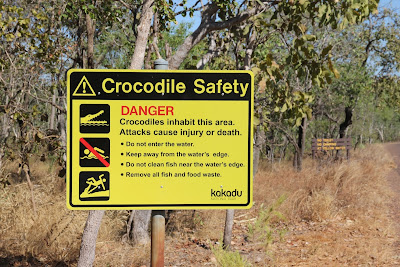[Unfamiliar Territory: Part 2]
 |
[A log with eyes? Crocodile on Yellow Water Billabong, Kakadu.] |
Never smile at a crocodile, No, you can't get friendly with a crocodile
- Jack Lawrence and Frank Churchill
Ornithorynchus anatinus and Crocodylus porosus have one thing in common. Both the platypus and the estuarine crocodile can be mistaken for logs, albeit of different sizes, when seen floating on the surface of water. But that is very much where the similarities end.
Before I see my first crocodile, it has lurked in my mind much as sharks do when I take to the surf.
I am swimming in Darwin Harbour in an area that looks far too manicured for crocs. I'm pretty certain it is also netted. Nonetheless, as my legs scissor and my arms thrash about, fleeting fears bubble up, literally from below. I imagine a staggered, snaggled set of teeth steeling up from beneath and ending my life in a particularly messy fashion.
In a Kakadu billabong, in the relative safety of a flat-bottomed boat, I wonder if I’ve found my chance to dampen those fears with a dose of reality. As we edge closer to a long dark shape atop the lily-spattered billabong, it flexes its tail and heaves to alongside us. From the top of the crocodile's roughly chiselled head, a prominent, marbled-brown eye regards us, unblinking.
We drift slightly apart before another micro-waft of the tail brings it back towards us, both eyes now facing our way. Looking into those vertically-slit spheres, I can understand those who see something inherently fearsome in such 5 metre long predators. The local NT News, for instance, demonises crocs ad nauseum.
As I regard this crocodile’s angular excellence, its shapely, patient snout, its slit-eyed regard, I cannot help admiring it. Through more than 200 million years of earth history this beast and its ancestors have lived in waters like these. In that time they have seen the coming and going of the dinosaurs, and have survived several ice ages, all the while honing their hunting skills to an unsettling perfection.
But in that amber eye I also see something unlooked-for. There’s a fragility, a reticence, that reminds me of my dog in her most sheepish moments. It may be pure fancy – either that or plain perversity – but I find myself smiling. How could I not, when I am suddenly seeing this crocodile as a dragon flung to earth? No, to water! One close-up view has made me want to dialogue with this "devil"; to know its story.
 |
[Dragon in exile? An estuarine crocodile in Kakadu National Park, Northern Territory] |
I want to ask: what sin brought about your exile? What offense caused your fiery breath to be doused; your proud wings to be clipped; your eager ears to be pinned flat; your stout legs to be truncated? What transgression reduced your diet to fish and fowl, with only the occasional careless mammal for variety?
In local Aboriginal language crocodile is Ginga (rhyming with "singer"). In the creation era, he killed a man, and was subsequently restricted to the lowlands. Children are also told the story of the star-dwelling Namarrgarn Sisters, who enjoyed coming down to play near the water. They took to frightening each other by changing into crocodiles that suddenly lunged out of the water.
The story is meant to warn children about crocodiles and explain why they are so dangerous. I suppose it’s fair to say that the advice is not unlike that in Lawrence and Churchill’s song, or for that matter in the signs at every Kakadu waterhole. But whether the warning be sung, recited or put on a sign, I think I'll always reserve the right to smile at the thought of Ginga as a dragon in exile.
 |
[You have been warned! A crocodile safety sign in Kakadu.] |
1 comment:
A particularly vividly written entry.
I have a secondhand appreciation for all things reptilian, due to a few herpetologist friends, and this account of yours rang true.
(I sometimes wish I could experience this firsthand - but maybe not, eh? One of the few good things about smimming in northern waters is the lack of anything this large.)
Post a Comment